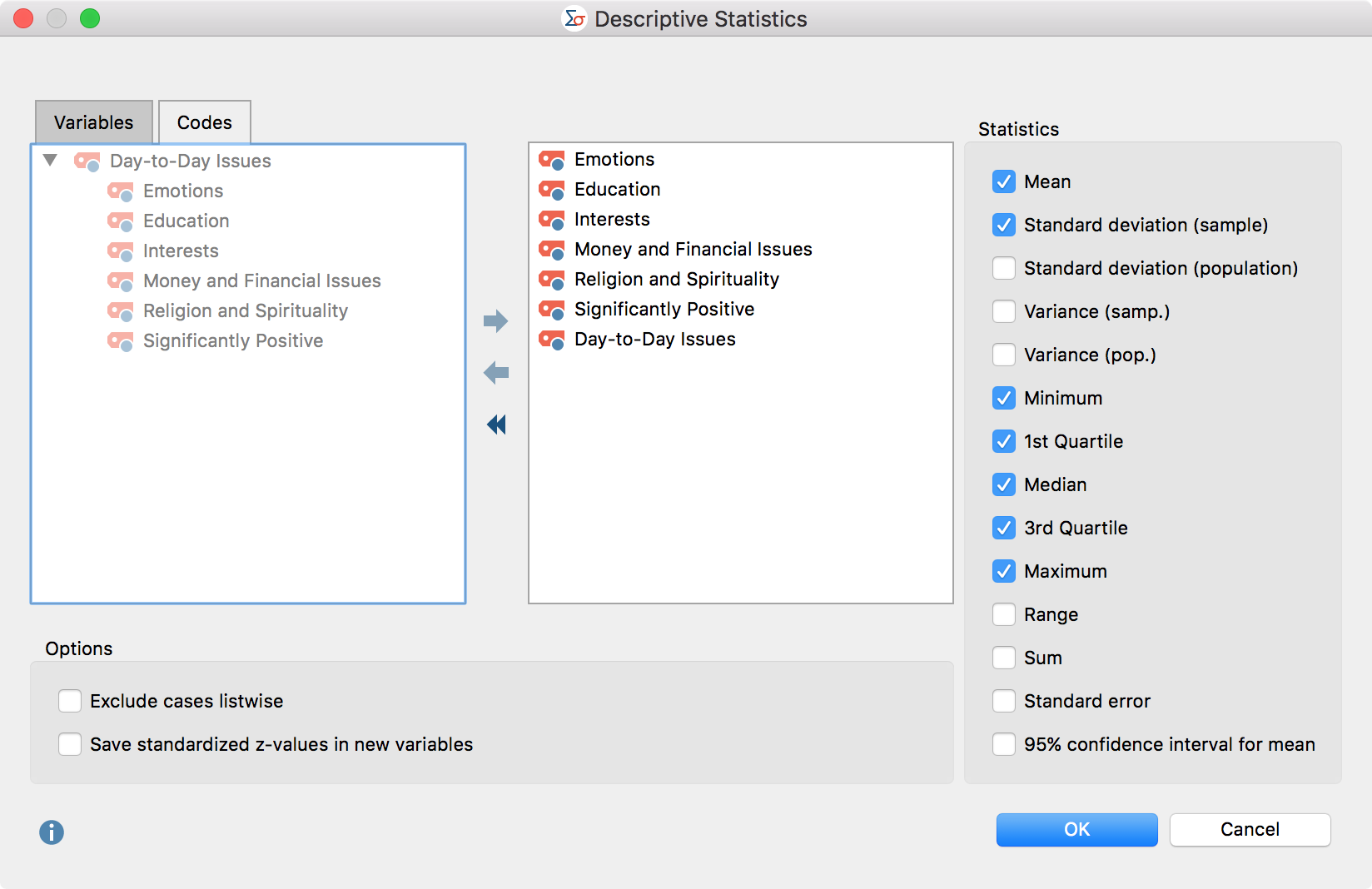MAXQDA
Introduction (9–15)
Michael C. Gizzi, Stefan Rädiker1.
Using MAXQDA in Ethnographic Research:
An Example with Coding, Analyzing, and Writing (17–33)
Danielle N. Jacques2.
Using MAXQDA in Qualitative Content Analysis:
An Example Comparing Single-Person and Focus Group Interviews (35–53)
Natalie Santos, Vera Monteiro, Lourdes Mata3.
Using MAXQDA’s Visual Tools:
An Example with Historical Legal Documents (55–70)
Andreas W. Müller4.
Using MAXQDA from Literature Review to Analyzing Coded Data:
Following a Systematic Process in Student Research (71–88)
Michael C. Gizzi, Alena Harm5.
Using MAXQDA for Analyzing Focus Groups:
An Example from Healthcare Research (89–106)
Matthew H. Loxton6.
Using MAXQDA for Analyzing Documents:
An Example of Prioritization Research Design in Urban Development (107–120)
Temur Gugushvili, Gvantsa Salukvadze7.
Using MAXQDA for Identifying Frames in Discourse Analysis:
Coding and Evaluating Presidential Speeches and Media Samples (121–133)
Betsy Leimbigler8.
Using MAXQDA’s Summary Features:
Developing Social Types in Migrant Integration Studies (135–147)
Aikokul Maksutova9.
Using MAXQDA for Bibliographic Documentary Analysis:
Combining Automatic and Manual Procedures Within a Literature Review (149–167)
Antoni Casasempere-Satorres, Marisa Vercher-Ferrándiz10.
Using MAXQDA in Teams and Work Groups:
An example from Institutional Evaluation and Organizational Data Analysis (169–184)
Christian Schmieder, Joel Drevlow, Josset Gauley
MAXQDA Virtual Conference on March 23 & 24. Spss para mac free download. And our free webinars will allow you to stay in touch with the MAXQDA community in the coming year. Best regards from Berlin- and please stay healthy, Your MAXQDA Team. MAXQDA is the world-leading software package for qualitative and mixed methods research and the only leading QDA software to offer identical features on Windows and Mac. It is one of the most comprehensive qualitative data analysis programs and is used by thousands of researchers in more than 150 countries. MAXQDA is a qualitative data analysis tool designed to help researchers, educational institutions, and NGOs systematically organize, evaluate, interpret, and publish textual and multimedia data across websites, tweets, survey responses, and group discussions. The purpose of this study is to compare two different Computer Assisted Qualitative Data AnalysiS (CAQDAS) packages (NVivo and MAXQDA) on a specific aspect. The same data from an auto-photographic study is analyzed using the same approach to make the comparison.
Maxqda 2020
This book provides ten case studies with concise real-world examples illustrating how MAXQDA is used in practice. In each research example, the authors present their way of using MAXQDA, addressing a variety of practical questions, such as how the coding system was developed, how coded documents were analyzed, what tools were used, and how those tools informed the results. Embedded in the context of each research example, readers can follow analytical processes step-by-step and gain insights into efficient ways to use MAXQDA.
Can i download flash player on my macbook pro. Readers can benefit from this book in several ways:
• Get inspirations and solutions for their own projects
• Avoid pitfalls by considering the lessons learned from each author presented at the end of each chapter
• Use the examples in teaching
Cyberghost. Audience:
• All researchers who want to get to learn the potential of qualitative data analysis with MAXQDA
• All users of MAXQDA who want to expand their knowledge and skills, no matter if they are novices or experts
Michael C. Gizzi
Dr. Michael C. Gizzi is a professor of criminal justice at Illinois State University, USA. He holds a doctorate in political science, and his research focuses on constitutional criminal procedure and judicial process. He is a professional trainer and consultant for MAXQDA and uses it in research courses, workshops, and webinars.
Stefan Rädiker
Maxqda 2020
Dr. Stefan Rädiker is a consultant and trainer for research methods and evaluation. He holds a doctorate in educational sciences and his research focuses on computer-assisted analysis of qualitative and mixed methods data (www.methoden-expertise.de).
Abstract
The purpose of this study is to compare two different Computer Assisted Qualitative Data AnalysiS (CAQDAS) packages (NVivo and MAXQDA) on a specific aspect. The same data from an auto-photographic study is analyzed using the same approach to make the comparison. The comparison is not based on a data oriented evaluation, but the methodological approach used constitutes the basis for the evaluation. The criteria for the evaluation of these tools are: closeness to the data, ease of coding and memoing, and the interrelationship among the data, code and the memo which were derived from the methodological approach. The first level coding process was accomplished using Grounded Theory Methodology (GTM) with two different CAQDAS packages. As for the result, in the GTM interpretation is crucial and MAXQDA supports the interpretive style better than NVivo. URN: http://nbn-resolving.de/urn:nbn:de:0114-fqs1101345
Downloads
Maxqda 10
Maxqda 2018
Copyright (c) 2011 Elif Kuş Saillard
Maxqda Hva
This work is licensed under a Creative Commons Attribution 4.0 International License.
